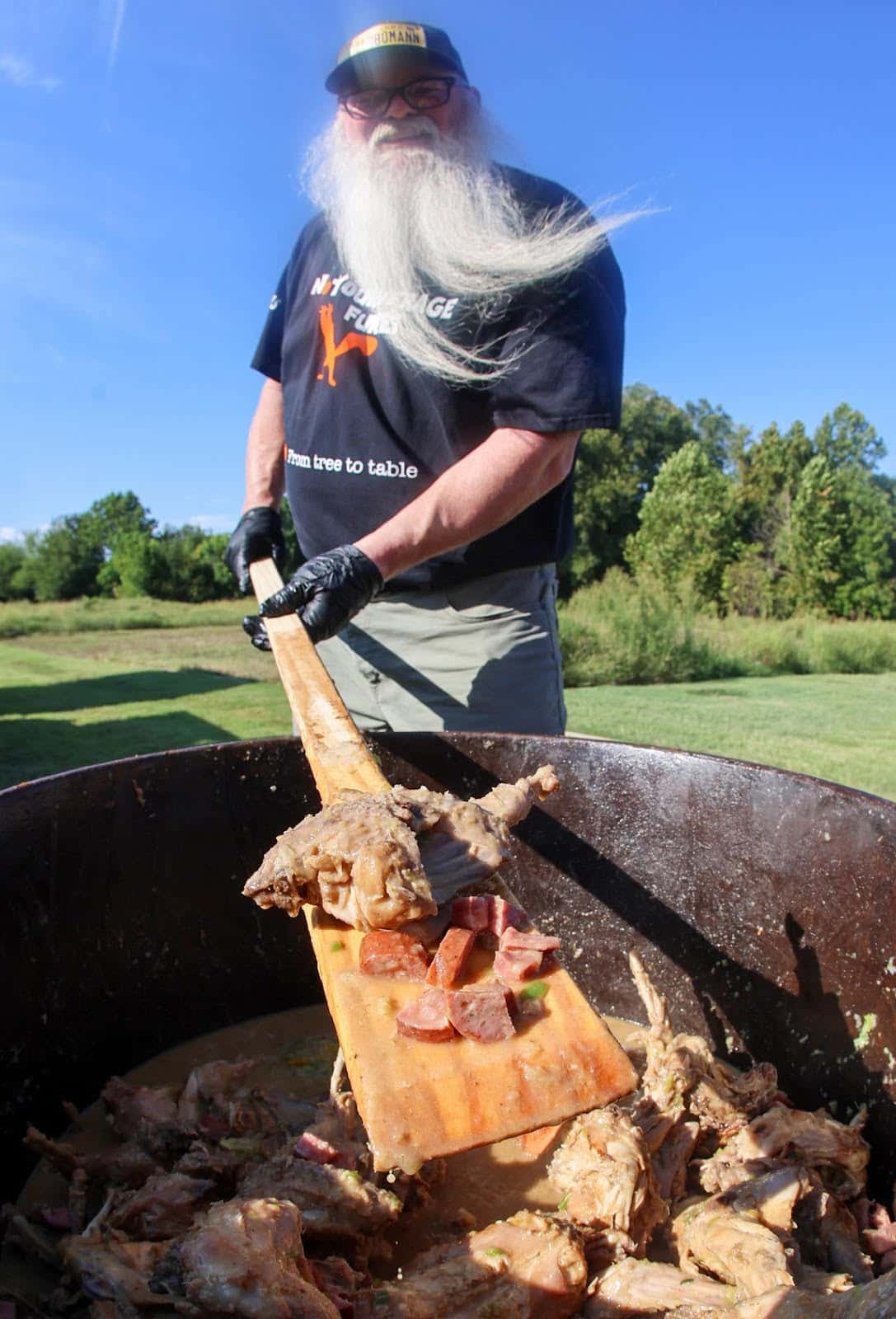By Mary Hightower
U of Arkansas System Division of Agriculture
LITTLE ROCK — The U.S. Department of Agriculture’s latest farm income forecast, showing a somewhat rosier picture than it forecast in February, is a tale of record yields, black swans and tenant farmers.
At left, Hunter Biram, at right, Ryan Loy, both extension economists with the U of Arkansas System Division of Agriculture. The two chime in on the implications of the Sept. 5, 2024, farm income update from USDA. (U of A System Division of Agriculture image)
The report, released last Thursday, showed net farm income was expected to decline 4.4 percent, compared to the 22 percent USDA had forecast earlier in the year. The forecast is the result of a complex intertwining of factors including available stocks of commodities, predicted yields and “black swan” events such as the COVID pandemic and persistent drought.
USDA said net farm income was forecast at $140 billion, down 4.4 percent from the previous year.
Broad strokes
The overall farm income report is influenced by expectations for the sales of livestock and poultry and plant commodities. Cash receipts from commodity sales were expected to decrease by $9.8 billion, from $526.3 billion in 2023 to $516.5 billion in 2024.
“The expectations of animal receipts in February was much lower and that was putting downward pressure on everything else,” said Ryan Loy, extension economist for the University of Arkansas System Division of Agriculture. “But now, the USDA thinks animal receipts are going to offset low crop receipts.”
USDA put the value of production of livestock at $19 billion and the value of crop production at minus $25.6 billion.
Loy said “On the crop receipt side of things — driven mostly by corn and soybeans, because they have the most acreage overall — corn is going to be down about $16 billion. Soybean is going to be down about $8.6 billion.
“What they’re predicting is just the crop receipts alone is going to be down about 10 percent to about $249 billion,” he said.
Record yields
Corn and soybean stocks from the previous growing year were high, and 2024 looks like another high-yield year. USDA’s National Agricultural Statistics Service was forecasting record corn and soybean yields for the United States, including Arkansas.
Slide from USDA presentation on farm income. ((mage courtesy USDA)
Following supply and demand, those high supplies mean “we don’t have any supply constraints on prices,” Loy said, a situation made worse by the lowering Mississippi River preventing shippers from moving full barges of commodities out to the Gulf of Mexico.
USDA also said the cost of crop production would decline by $4.4 billion, or 1 percent, due to lower costs of inputs such as fertilizer and fuel. Loy said the decline in production costs might have another cause: “They might be a function of leaner operations” that simply aren’t buying as many inputs as they have in previous years.
The forecast said farm sector assets would increase 5.2 percent while debt would increase 4.2 percent.
Farm equity is also a factor in how net farm income is calculated. USDA is forecasting a brighter picture with farm equity increasing 5.3 percent, although it’s unclear whether its equity forecast includes tenants that are non-farm owners — those who rent land to farm.
According to 2017 USDA figures, 6.7 percent of Arkansas farmers are tenants.
“The tenants are the ones who are really going to be impacted this year,” Loy said. “They don’t have as much of their equity in land. Land appreciates over time, whereas tenants typically have equity in depreciable assets, such as machinery.
“In a time where cash on hand is important, having equity in machinery versus land means you may only recover a portion of your debt obligation through sales of machinery,” Loy said.
Shifting from market-based to emergency-based
Government assistance to farmers was another significant shift under the report’s surface, said Hunter Biram, an extension economist with the Division of Agriculture. Biram is also associate director of the Southern Risk Management Education Center. This assistance is also included in the calculations for net farm income.
USDA said direct government payments were forecast to decline $1.8 billion, or 15.1 percent from 2023 to 2024.
There are several types of government assistance to agriculture: programs that provide a safety net from commodity market fluctuations, supplemental assistance in case of natural disaster, resource conservation incentive programs and ad hoc programs.
ARC, or Agriculture Risk Coverage, and PLC, or Price Loss Coverage, are market-based programs that financially protect farmers from substantial drops in crop prices or revenues. Both programs are legacies of the 2014 Farm Bill. Non-market-based assistance available to farmers includes ERP, or Emergency Relief Program, and ad hoc programs such as the Pandemic Assistance Revenue Program, Coronavirus Food Assistance Program and the Pandemic Market Volatility Assistance Program.
“What I find particularly interesting is that shift in proportion of assistance from majority ARC and PLC — market-based assistance — to majority supplemental assistance and ad hoc assistance,” he said.
“From 2015-18, the percentage of government assistance attributed to these market-based programs averaged about 48 percent,” Biram said. “Supplemental programs, that average was about 18 percent and conservation programs was about 31 percent.
“Now, if you look at 2019 through the 2024 report released on Sept. 5, the ARC-PLC percentage is 7 percent, the supplemental proportion is 69 percent, and conservation is 22 percent,” he said.
“The implication I see immediately is that the current market-based programs are potentially outdated,” he said. “They were written for the 2014 Farm Bill with no significant changes in the ’18 Farm Bill.”
Asked if the shift from market-based to ad-hoc was due to higher incidences of natural disasters or other events, Biram said, “it could possibly be from more frequent what people call ‘black swan’ events — these events that have very low probabilities of occurring like the pandemic, like the Russian invasion of Ukraine.
“It could be that supplemental assistance is more feasible to roll out versus changing the existing commodity programs,” he said. “But it doesn’t diminish the fact that the commodity program has not provided adequate risk protection in recent years. I think there is an implication for an improved safety net. And while these are low-probability events, I don’t think they explain the difference in 48 percent versus 7 percent.”
ERP on its own is another factor in the improved forecast for net farm income, Biram said.
“Most of the government assistance for the years 2022-2024 are the Emergency Relief Program and conservation programs,” Biram said. “ERP assistance for the 2020-2021 crop years was delivered in two phases in 2022 and 2023. In 2024, another round of phase one payments are projected to be released due to a rule which limited ERP assistance to producers who received federal crop insurance indemnities.”
To learn about extension programs in Arkansas, contact your local Cooperative Extension Service agent or visit www.uaex.uada.edu. Follow us on Twitter and Instagram at @AR_Extension. To learn more about Division of Agriculture research, visit the Arkansas Agricultural Experiment Station website: https://aaes.uada.edu/. Follow us on Twitter at @ArkAgResearch. To learn more about the Division of Agriculture, visit https://uada.edu/. Follow us on Twitter at @AgInArk.

























